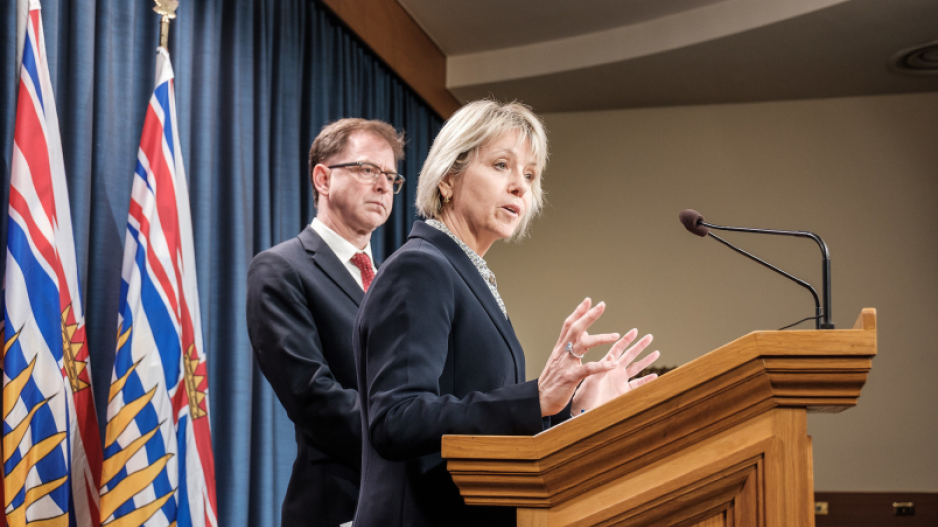What happened: B.C. on April 3 reported 53 infections and four deaths as a result of the COVID-19 pandemic in the past 24 hours, resulting in a total of 35 deaths and 1,174 infections.
Why this matters: Although the rate of new infections is slowing, the number of infections and deaths keeps rising, showing that the pandemic is still a serious issue and government regulations aimed at keeping people at home (and businesses closed) will stay in place for the foreseeable future.
When B.C. officials relayed their daily accounting of COVID-19 infections and deaths April 3, the good news was that there has been a reduction in hospitalizations. There are now 146 people in hospital, down by two people from April 2. Of those, 64 are in the intensive care unit.
The bad news, aside from the four new deaths, is that the number of seniors' care homes in which there has been at least one infection has risen by one, to 22. Neither provincial health officer Bonnie Henry nor Health Minister Adrian Dix revealed the name of that 22nd seniors' home.
Henry said, however, that in total there have been 176 infections in care homes, including two large outbreaks: at North Vancouver's Lynn Valley Care Centre and at Vancouver's Haro Park Centre. She last provided a full breakdown on how many cases were in each home on March 26. Back then, Lynn Valley Care Centre had 70 cases while Haro Park Centre had 58. The "vast majority" of the cases at care homes are still in those facilities, she said April 3.
For a full list of all of the seniors' care homes that have had COVID-19 cases, except for the unidentified one revealed today, click here. There was no update on whether what Henry has called the "complex" web of employment contracts has been sorted out so officials can execute her order to require all care-home workers to exclusively work at a single facility. As of yesterday, that order was not fully in effect. For more on that, click here.
Henry said that she is "heartened" that recent outbreaks at care homes have been of a single case.
The number of COVID-19 infections broken down by health region are:
• 541 in Vancouver Coastal Health;
• 412 in Fraser Health;
• 74 in Island Health;
• 126 in Interior Health; and
• 21 in Northern Health.
There have been 641 people that the government considers to have fully recovered.
Health Minister Arian Dix relayed the number of COVID-19 patients who are in hospital. Those numbers are:
• 57 in Vancouver Coastal Health;
• 63 in Fraser Health;
• 10 in Island Health;
• 12 in Interior Health; and
• four in Northern Health.
There are 4,399 empty hospital (acute care) beds in the province. The province's move to suspend what it considers "elective" or "non-essential" surgeries has helped hospitals reduce their cumulative occupancy rate for beds to 59%, down from the usual occupancy rate of about 103%.
Dix said 54.3% of the province's critical-care hospital beds are occupied. That low occupancy is intended to help the province have capacity if there is a surge in hospitalizations from the virus that causes a severe pneumonia and has an estimated 15% fatality rate in seniors.
Emergency room visits are also a shadow of what they once were. Yesterday, B.C. hospitals counted 3,117 visits, which is down from 6,559 on March 10, Dix said.
Dix also revealed new data for cancelled "elective" surgeries B.C.-wide between March 17 and April 2: 11,276. Of those, 1,208 were hip or knee replacements.
Dix aimed to reassure people who want to have their surgeries done, by saying "you are still on the list. We are committed to getting back to these procedures."
He also weighed in on how the federal government could do a better job at restricting travellers and controlling the spread of the virus.
"Clearly, there needs to be a much stronger presence in response at airports," he said. "We should see no diminution, it seems to me in the response that we've seen, in previous returns of people, for example, from cruise ships. We have to have a vastly greater capacity to use the Quarantine Act, which has been used in British Columbia, but we need a much stronger capacity to do that. We need to actively follow-up with cases. We need access to the full information when people come to Canada. The B.C. health system needs that access to full information from the government of Canada. We need stronger action."




